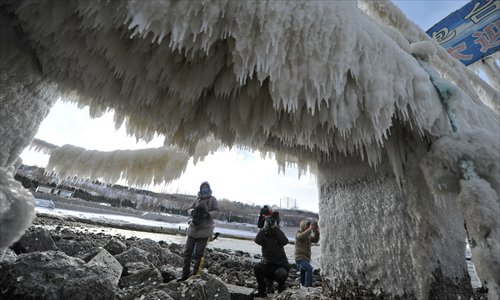Arctic blast engulfs China
Guangzhou sees first snowfall in half a century

Icicles hang over a bridge in Yantai, Shandong Province on Sunday as China was hit by the worst cold front in 30 years at the weekend. Photo: CFP
The worst cold front in three decades hit most parts of China over the weekend, plunging temperatures by up to 10 C and playing havoc with travel arrangements as the Spring Festival travel rush officially got started on Sunday.
Beijing braced for a 30-year low of -16 C from Saturday through Sunday, the Beijing meteorological station said.
Chongqing and Guangzhou saw snow for the first time in decades. The last snowfall in Guangzhou was in 1967, almost five decades ago.
On Saturday, 337 flights were reportedly canceled and another 178 delayed in Chongqing as of 8 pm, news site chinanews.cn reported.
Until 2 pm Sunday, East China's Zhejiang Province had suffered 380 million yuan ($57.75 million) in economic loss due to the extreme weather. Some 75,000 hectares of crops were affected, website Zhejiang online reported.
Responding to public concerns over whether the cold snap would be as destructive as the one in 2008, Sun Jun, chief forecaster on duty with the National Meteorological Center of the China Meteorological Administration (CMA) said that this spell of cold weather would not have the same disastrous consequences as when central and southern China saw massive disruption by snowstorms in 2008.
Sun further noted the current extremely cold weather will not last too long.
"The temperatures in some parts of northern China like Beijing started to pick up on Sunday, while southern China will see a rise in temperatures beginning Tuesday," Sun told the Global Times on Sunday.
In January 2008, central and southern China were hit hard by a series of snow and sleet storms due to persistent cold fronts, leaving more than 120 dead and 1.66 million displaced. The adverse weather had caused direct economic losses of over 150 billion yuan ($22.8 billion) by the end of February, Caijing magazine reported in March, 2008.
On Wednesday, the CMA issued a blue alert for the cold front and the alert was adjusted up to orange - the top-level warning for cold weather - on Saturday.
Not urgent consideration
The old debate over central heating in southern China was once again ignited on the Internet.
In China, central heating is only available north of the Yangtze River.
"The proposal to supply heating was once presented, but not much progress has been made," Wang Liquan, former head of the Development Research Center of Guizhou Provincial Government, told the Global Times on Sunday.
"We can't say it's urgent to promote a central heating service in southern China unless we have enough data to show that such extreme weather will become a common meteorological phenomenon in the south," Zhang Yuanxun, an expert on environmental sciences at the Chinese Academy of Sciences, told the Global Times on Sunday.
Pang Jun, a climate scholar at the Renmin University of China, said that it would be unrealistic to supply heating on a large scale in the south, under the current environmental and energy constraints.
While local residents would welcome it, the increased coal consumption would put too much pressure on the pollution control, and it may not be worthwhile as the cold season is relatively short.
"The smog problems in northern China which are to some extent caused by the burning of coal for heating have not yet been properly addressed," Pang noted.
While a consensus to supply heating has been reached, it may not be carried out in a centralized fashion, rather by individuals or communities for example, Xinhua reported.
"In places like nursing homes and hospitals, heating systems may be established," Zhang added, suggesting that more efforts should be made in the feasibility evaluation of central heating in the south.
Heating supply in southern China may be taken into consideration in the future when clean energy can be used to largely replace coal in the heating supply system, according to Pang.
An official from the Ministry of Housing and Urban-Rural Development responded that decentralized and individual heating would be advocated in terms of the heating supply in the south to meet people's various needs for heating, according to Xinhua.